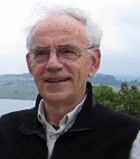Founding Directors
David J. Goa, Director [2005-2016]
When Dean Roger Epp asked David Goa to become the Founding Director of the Chester Ronning Centre for the Study of Religion and Public Life, Augustana Campus, University of Alberta, it was a bit of the past coming to meet him from the future. David was born in Camrose, and as a child, he knew Chester Ronning, whose name graces the Centre. Arguing that issues of religion and public life were far too important to be left solely to the Academy, David focused the Centre's work in the public square, with religious communities and in the Academy. Over a decade, his work engaged many of the most demanding issues in our society, seeking to pull forward the best thinking in religious traditions and civil philosophy. David aimed to deepen thinking on contentious issues and find ways for those with strongly held and competing perspectives to engage each other and find hospitable ground to nurture the common good. His regard for local goodness and his international reach knit a rich body of programming and research, pulling forward the capacity of the university in service to public understanding.
From 1973 - 2004, David developed the program for the study of culture at the Royal Alberta Museum through his extensive field research in many religious communities that make Alberta their home (Hindu, Buddhist, Sikh, Jewish, Muslim and Christian).
He is the author of over twenty books and hundreds of essays and articles on religion and modern culture, religious dialogue, art and religion, Christian Orthodox theology and the spiritual life. David is a regular contributor to the media and he lectures widely throughout Canada and most recently in Syria and Türkiye.
He is curator of the internet exhibition The UEncounter (2014), exploring fundamental human questions, and was the chief curator for the internationally acclaimed exhibition Anno Domini: Jesus Through the Centuries in the year 2000. His recent book The Christian Responsibility to Muslims is the fruit of his work in Muslim communities. Mantra, Hearing the Divine in India and America (Columbia University Press, 2004 and written with Harold Coward) remains a standard text for university students. A collection of his essays on the spiritual life and modern culture, A Regard for Creation (Synaxis Presss, 2008) has been translated into several languages. In his book, Working in the Fields of Meaning, Cultural Communities, Museums and the New Pluralism (Ronning Centre, 2013), David highlights the ways public institutions may enrich the public square by working with the many and varied cultural communities that make up Canada.
David continues to teach and offer seminars and workshops on topics such as leadership in times of deep difference, tradition and modern culture, issues of religion and public life, and the gifts of religious tradition. These teachings are one of the many ways he seeks to move public and religious discourse beyond the ideological silos that so often limit public understanding.
David has received the following awards:
- Citation of Merit, Hindu Society of Alberta, 2002
- Inducted into the City of Edmonton Cultural Hall of Fame, 2001
- Premier's Gold Medal for Anno Domini, 2001
- Queen Elizabeth II Diamond Jubilee Medal, 2001
- AMPIA Award, with Jeremy Chugg: Eight nominations for the video "Jesus in the Age of Television"; two first awards, Educational Video and Promotion, 2001
- Eugene Johnson Award from Christians in the Visual Arts at their Dallas conference, 2001
- Humanitarian Award, Monastery of All Saints of North America, 2001
- The Golden Key Society, University of Alberta, 2001
- Shevchenko Medal, Ukrainian Canadian Committee, 1989
- He has been listed in Canada Who's Who, since 2001.
Read about David's work with the Centre in this Cardus interview from Dec 19, 2008.
Dittmar Mündel, Interim Director [2004-05], Associate Director [2005-14]

When Augustana University College, owned by the Evangelical Lutheran Church in Canada, was negotiating its terms of merger with the University of Alberta, Dittmar Mündel as both a member of the Lutheran clergy and a professor of Religious Studies at AUC, was in the unique position of facilitating the creation of two legacy projects that would carry forward some of the spirit of the ELCIC college, as it became the Augustana faculty of the U of A.
One project became the Chaplaincy program. The second was a Centre for the Study of Religion and Public Life. To establish the formal structures for such a Centre, Dittmar worked with the national Lutheran bishop, a local committee, then dean Roger Epp, who was able to bring this Centre into being institutionally.
Dittmar served as the interim director until the first director David Goa was able to take the helm. It was David Goa's academic research and writings, his experience in the field, and his vision of what such a Centre could be, that shaped the Chester Ronning Centre with its distinct way of working in the academy, in the public square, and in religious communities. Subsequently, Dittmar, as associate director, and David Goa team-taught annual courses in "Religion and Public Life" (with different topics each year) to both undergraduate credit students and community members; assisted David in a range of both academic and community-based conferences and workshops; and was one of the sounding boards for creating the annual focus of the lectures, workshops, cafés, and courses that the Chester Ronning Centre offered--predominantly in Alberta, British Columbia and Saskatchewan.
While David expanded the work of the CRC to Ottawa and internationally (e.g., Syria and Türkiye), Dittmar helped to extend the work of the Chester Ronning Centre into rural Albertan communities-culminating in offering Spirit of the Land courses and conferences together with Chester Ronning Centre's Junior Fellow, Rajan Rathnavalu.